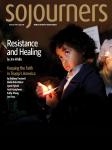"In the wake of this election, the role of faith communities is imperative," writes Jim Wallis in "Resistance and Healing." With this in mind, we asked a few Christian leaders how followers of Jesus can best practice resistance and healing in Trump's America. Though varied, the responses we received have a common theme: Christians must stand in solidarity with the vulnerable. Now and always. —The Editors
Resistance is Holy Work
RESISTANCE IS HOLY WORK. Resistance is what it means to tell the truth and defend people in public, even—and especially—when it is inconvenient, dangerous, and uncomfortable.
What truths must we tell? We must tell the truth that the entire world is not white, straight, Christian, cis-gendered, American-born, male, or able-bodied, and that those of us who aren’t matter just as much as those of us who are. We must tell the truth that rhetoric and policies that encourage violence against those same people is not of God and not of the freedom we espouse. We must tell the truth that if all of us were truly created equal, then the cancer of xenophobia makes all of us sick—and that none of us are truly free until we are all free.
We did not lose an election as much as we validated and normalized a way of life that is beneath our humanity—and, therefore, which requires our resistance. The Christ I serve did not sit idly by in times like these—for in eras like this one, inaction is a sin. Inaction perpetuates this latest wave of hate just as much as if you painted a swastika yourself. Hate should never be welcome in our homes, at our tables, in our worship, or in our country.
It is holy to resist such things. Holy resistance means calling out that hate by name and casting it out of where you are—of where you want God to be. Casting it out means no longer making excuses that your grandfather just talks like that because he is elderly; it means withholding your tithes and membership from those places that will not be safe havens and sanctuaries for those persecuted under potential new rules of law; it means challenging the notion that we stitch together a false unity rather than acknowledge the explicit danger many of us are now placed in.
Holy resistance means praying for those who persecute—but protecting the persecuted. Christians must be people of moral conscience, those who conscientiously object to hatred, division, racism, and sexism as unashamedly as we claim Christ. The call to be in the world and not of it was for such a time as this—we must be the light that shines on injustice and calls out our humanity to replace the evil we see.
Resistance is holy work. That makes it our work.
The Strong Heart of God’s People
THIS IS APOCALYPTIC, in the truest sense of the word (meaning, a “revealing”). We live in the same country we did before the election, but the ugliness is just less hidden.
But something else is also being revealed, and that’s the strong heart of God’s people. People who place more hope in The Kingdom than in The Government. People who will stand with the vulnerable. People who will love harder.
People who have been swept up into the radical reconciliation and mercy of a crucified and risen God and who will use that, and not the results of an election, to determine what we believe, who we consider worthy, what is worth paying attention to, what we value, and in whom we place our trust.
The Kingdom of God has always grown strong in challenging times, and I believe with everything in me that it will do so now as well. May it be so.
Connecting the Disinherited
AS A CITY CHURCH LEADER, I realize it’s important for us to rest our sights and our engagement locally while building bridges with our more distant neighbors. Issues such as immigration, punitive policing, and the diminishment of the middle class are expressed in our own backyards.
What will it require for those of us who suffer from the malady of middle-class aloofness to build bridges with those who have been disinherited in their own neighborhoods and will be under the threat of further disinheritance under the administration to come? How can we bridge the divides between the urban and rural poor?
Some years ago I supervised a seminary intern who had done organizing and pastoral work in Appalachia and other rural areas. He opened my eyes about abject poverty in rural contexts. He even helped some of us city dwellers plant a garden in East Harlem. Through planting together, sharing laughs, and telling stories, many of us developed a new perspective on rural poverty. And the intern learned what poverty looked like in gentrifying Harlem.
We were all able to better understand what Martin Luther King saw in trying to unite poor people all over the country through the Poor People’s Campaign. That kind of engagement with the unsanitized dreams of Dr. King will be essential in the months ahead.
A Deeper Walk of Solidarity
by Lynne Hybels
MUCH OF MY GLOBAL work is with people of peace in the Holy Land—Israelis and Palestinians who refuse to view the other as enemies, who listen to those with whom they disagree in an authentic attempt to understand, who refuse to give in to hopelessness, and who recommit themselves daily to equal human rights and the common flourishing of all Jews and Arabs in the land.
Theirs are the voices in my head since the election as I ponder what shape my actions should take in the months and years to come. On one hand, it will require humbly listening to the majority of evangelicals who voted differently from me, listening for the sake of understanding and empathy, which is the beginning of healing.
On the other hand, it will require a truer and deeper walk of solidarity with vulnerable minorities who—if campaign promises and threats are carried out—will become tragically more vulnerable. I know I will have to rely on the profound power in repentance, forgiveness, deep listening, careful speaking, and humility.
Resistance Takes Action
by Kathy Khang
I HAVE NEVER HAD A HANGOVER, but I think this is the closest I want to come to one. With that in mind, I want to educate myself and challenge my fellow Jesus-followers to do the same. We don’t have to hold our collective breath for the next four years. There are small steps we can take, starting now.
Give each other (especially Muslims, people of color, etc.) plenty of space to grieve, heal, and recharge. I don’t care if it’s December or 2017. Some white people just woke up to a reality the rest of us have been living and screaming and dying about, and you are still trying to figure out how to make sure people know you’re not in the 81 percent of white evangelicals who voted for he-whose-name-I-still-cannot-utter-without-swearing. It doesn’t matter. You need to give me, my husband, my daughter, and my sons space to grieve. You can take action without waiting for me to thank you for not being one of “those” white people.
Don’t make a call to “unity” before you issue some apologies. Don’t do it on social media. Don’t do it from the pulpit. Don’t say it out loud.
Educate ourselves about where local, state, and national leaders are and are not taking action. We need to hold them accountable as well as keep ourselves informed and in conversation with our neighbors about what is happening locally and nationally. I might even attend a local government meeting or two wearing a shirt that proclaims “Black Lives Matter” or “Nasty Woman” or “Lord, Give Me The Confidence of a Mediocre White Man.”
Speak up and speak out, knowing fully we may risk friendships and polite family gatherings. When we hear something that stinks of racism, privilege, white supremacy, white nationalism, or misogyny, we need to stop it and correct it, whether it’s something we hear on the playground or in church. We need to have the courage and the conviction to step in when we see or hear something and stop being silent observers. We need to ask and then demand that our pastors preach about the sin of racism. We need to recognize this is not politics as usual.
We need to find ways to use our bodies and voices to be present and speak out for the marginalized. Put ourselves physically in between people in public altercations. Say something to our pastor or parent or co-worker or boss if we hear them say something that normalizes racism and white nationalism. Write letters to and call our politicians and denominational leaders. Financially support justice work. March if we can march.
Resistance takes action.
My Pledge of Resistance
by Joe Roos
DEAR PRESIDENT-ELECT TRUMP: I am a white, 70-year-old pastor from California. As a follower of Jesus, I seek the path of inclusion, justice, peacemaking, and love. Your campaign was dominantly about exclusion, inequality, the use of violence, and hatred of the other. I will follow Jesus, and not you.
Jesus spent his entire life living with and caring for the poor and the marginalized. He was once himself an immigrant and a refugee. And he strongly opposed and repeatedly confronted the political, economic, and religious elite of his day, people like you.
If you pursue the policies you embodied during your campaign—the supremacy of white people over people of color, the literal and figurative creation of walls of division and hostility between people and nations, a misogynistic attitude and practice toward women, disdain for the poor, disabled, and marginalized, disregard for and ignorance about the environment, and encouragement of the use of violence toward those who disagree with you—if your policies as president continue down that path, I make this pledge of resistance to you today:
I will oppose you and stand against you every day of your presidency, following the example of Jesus of Nazareth, seeking peace, pursuing justice, and living nonviolently, including actions of nonviolent civil disobedience against you.
That is my promise.

Got something to say about what you're reading? We value your feedback!






